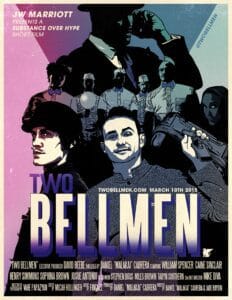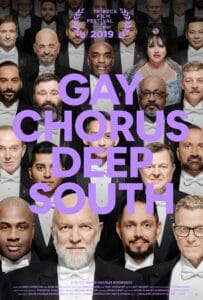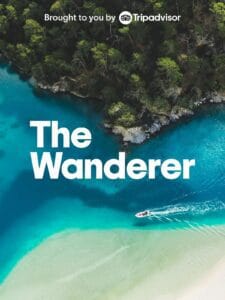This week, the third season of The White Lotus premieres on HBO Max. That it is a delightful comedy series I don't need to stress—with a 92% score on Rotten Tomatoes , that goes without saying. What is more interesting is the huge impact the series is having on the travel industry.
Travellers want to experience the locations of their favourite films and series in real life. This phenomenon, also known as film tourism , is a form of branding with unprecedented ROI. In a world where consumers are inundated with ads, it is crucial for brands to stand out in a way that doesn't feel like marketing, but like inspiration. But how do you harness this power effectively?
Set-Jetting: Films as Travel inspiration

According to the latest trend report from travel site Expedia, ‘Set-Jetting’ is a growing trend. A survey of 25,000 travellers in 19 countries shows that two-thirds of respondents say films and series influence their travel choices. Indeed, 36 per cent say this influence has increased in the past year.
One of the most famous examples is the impact of The Lord of the Ringstrilogy on New Zealand, which created Tolkien tourism. The country saw a 40 per cent increase in tourism, from 1.7 million visitors in 2000 to 2.4 million in 2006. Similar effects were seen with Game of Thrones, with Spanish and Irish film locations becoming tourist attractions. Tourism Ireland even went a step further with a creative campaign: 10 hand-carved wooden doors with Game of Thronesimages were placed in pubs near film locations. The result?
- £17 million in earned media
- 8% increase in tourism
- 17.5 million views and 126 million mensen reached
Brands as media companies

Not only destinations, but businesses are also benefiting from this trend. More and more brands are stepping into the role of media companies and producing their own content to create an emotional connection with consumers.
Marriott Hotels: From hotel chain to film producer
Marriott Hotels founded its own media company in 2014. In 2015, they already produced several successful projects, including:
- The Navigator Live (tv-show)
- The Two Bellmen (short film with multiple sequels; parts 2 and 3)
- French Kiss (short film, shot at a Marriott hotel in Paris)
These films not only generated millions of YouTube views, but also generated direct bookings. For example, a promotion around French Kiss generated $500,000 in additional revenue.
“A lot of brands will get into content marketing and want to produce the content themselves,” said David Beebe, Marriott’s Emmy-winning vice president of global creative.
“They’ll spend millions of dollars building a studio. They’re going to shoot film, all this stuff. What happens? You get in your own way. Then it becomes an ad. You start inserting your product. It’s a turn-off.”
Airbnb: Documentaries with impact
Airbnb uses storytelling to convey its brand values. For example, they produce the Apple TV+ series Home, which highlights extraordinary homes and their residents.

In addition, Airbnb funded and produced the documentary Gay Chorus Deep South, which premiered at the Tribeca Film Festival and won. According to Rotten Tomatoes, it is one of the 20 best LGBTQ films of all time. The film follows the San Francisco Gay Men's Chorus, which embarks on a 10-day Tour of the US Deep South in 2016 in response to a wave of discriminatory anti-LGBT laws and divisive elections. James Goode, head of creative at Airbnb, explains that the film underscores Airbnb's mission: to welcome everyone, regardless of background or orientation.
Tripadvisor: Travel based on genuine recommendations

Tripadvisor launched The Wandererin 2022, a travel programme on Prime Video, each destination has a different presenter, who creates a trip based on recommendations and reviews from Tripadvisor users.
Each episode of The Wanderer will be promoted on Amazon's Prime Video through a series of paid media placements and on Tripadvisor through paid and organic media. Viewers can get further inspiration through customised Tripadvisor destination guides created to accompany each episode.
The campaign has been such a success that the series has been extended for a second season and a third season is expected.
Dramamine: Humour as a branding strategy
Not all brands opt for traditional storytelling. Dramamine, known for travel pills for nausea, took a different approach. They capitalised on an unexpected emotion: nostalgia.
With their campaign The Last Barf Bag , they paid tribute to barf bags, which are being used less and less thanks to their product. A humorous short documentary put the barf bag in the spotlight. And refilled, for the first time in years, with something new: purpose. The campaign won the Grand Prix at Cannes last year and realised;
- 650 million impressions
- +23% Brand engagement
- +26% Sales
The White Lotus & Four Seasons: a golden collaboration
Back to The White Lotus. The luxury hotels where the series is set are benefiting hugely from the publicity. The Four Seasons Resort Koh Samui, where season 3 was partly shot, already saw bookings - despite the $2,000-per-night price tag - increase by 40 per cent. Chief commercial officer, Marc Speichert, expects that once the new season airs, it will continue to grow “exponentially”.
Indeed, earlier seasons had an even greater impact:
- The Four Seasons Resort in Maui and Taormina saw a 10x increase in bookings.
- High-end travel network Virtuoso reported a 424% rise in Sicily bookings after season 2.
Speichert, aptly sums up the power of entertainment branding:
“It also underscores the growing connection between travel and pop culture – two worlds that naturally complement each other, as travel fuels creativity and sparks curiosity on a global scale.”
What can brands learn from this?
- Tell an authentic story: Brands that use storytelling build a stronger emotional connection with their audience.
- Make entertainment the core of your strategy: Content that inspires and amuses feels more natural than traditional ads.
- Collaborate with filmmakers and platforms: By collaborating smartly with the entertainment industry, brands can be featured organically.
Entertainment has the power to make destinations irresistible. For brands that want to stand out in a saturated market, storytelling in the form of film and series is not a luxury, but a necessity.
Previously published on: Adformatie